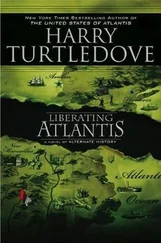Harry Turtledove - Opening Atlantis
Здесь есть возможность читать онлайн «Harry Turtledove - Opening Atlantis» весь текст электронной книги совершенно бесплатно (целиком полную версию без сокращений). В некоторых случаях можно слушать аудио, скачать через торрент в формате fb2 и присутствует краткое содержание. Жанр: История, на английском языке. Описание произведения, (предисловие) а так же отзывы посетителей доступны на портале библиотеки ЛибКат.
- Название:Opening Atlantis
- Автор:
- Жанр:
- Год:неизвестен
- ISBN:нет данных
- Рейтинг книги:4 / 5. Голосов: 1
-
Избранное:Добавить в избранное
- Отзывы:
-
Ваша оценка:
- 80
- 1
- 2
- 3
- 4
- 5
Opening Atlantis: краткое содержание, описание и аннотация
Предлагаем к чтению аннотацию, описание, краткое содержание или предисловие (зависит от того, что написал сам автор книги «Opening Atlantis»). Если вы не нашли необходимую информацию о книге — напишите в комментариях, мы постараемся отыскать её.
Opening Atlantis — читать онлайн бесплатно полную книгу (весь текст) целиком
Ниже представлен текст книги, разбитый по страницам. Система сохранения места последней прочитанной страницы, позволяет с удобством читать онлайн бесплатно книгу «Opening Atlantis», без необходимости каждый раз заново искать на чём Вы остановились. Поставьте закладку, и сможете в любой момент перейти на страницу, на которой закончили чтение.
Интервал:
Закладка:
"Oui, Monsieur." The courier repeated back the message. Roland nodded-he had it right. Neither the man nor his horse seemed thrilled at hurrying back in the direction from which they'd come. But the rider sketched a salute and rode off.
"In the meanwhile…" the lieutenant said.
"In the meanwhile, we go on," Kersauzon said firmly. "We would go on even if the King of France left all his men across the sea."
"What will you do, sir, if the French from France"-the younger officer smiled at his circumlocution-"have an officer with them who wants to take command, the way General Braddock took command for England?"
Spit in his eye, Roland thought. But he couldn't say that. If there was such an officer, it would surely get back to him. And so Roland was circumspect for once in his life: "I will point out to him that I am more familiar with local conditions than he is likely to be. I will also point out that General Braddock's misfortunes demonstrate how important familiarity with those conditions may prove."
"What if he chooses not to listen?" the nosy lieutenant persisted. "What will you do then?"
Hope he has an unfortunate accident. Roland Kersauzon couldn't say that, either. The theoretical officer slogging up the coast behind him would surely believe he aimed to arrange such an accident…and the usurping dog wouldn't be entirely wrong. "I will do the best I can," Roland said. "I will do the best he permits me to do."
"Surely he will value your experience," the lieutenant said.
"But of course," Roland murmured. He didn't believe it, even for a moment. A French officer sent to Atlantis would feel the same way prisoners said the English officer sent to Atlantis had felt: as if he were exiled from civilization. And it might be true; an officer who'd disgraced himself at the court might well suddenly find himself carried across the sundering sea to do what he could for a country that didn't care to look him in the eye any more.
Now Roland had to do things quickly and do them right, before the hypothetical officer could take charge and make a mess of whatever he touched. He swore at himself for all the delays he'd tolerated.
Well, he'd tolerate them no more. "Can't you move faster, you lazy lugs?" he shouted. "What are you waiting for? Are your feet stuck in the mud? They'd better not be, by God!"
One of the soldiers grumbled that Roland had some part of himself stuck somewhere else. He was not talking about feet or mud. Roland listened without rancor. Soldiers were going to grumble; it was part of what made them soldiers. As long as they grumbled while they marched, Kersauzon didn't mind a bit.
"If you want us to hurry so much now, why didn't you start us sooner?" A sergeant had the nerve to ask that to his face. Atlanteans who spoke English always bragged about how frank they were and how they spoke their mind to anyone, no matter who and no matter when. The French settlers here didn't waste their time bragging about such things. They just did them.
And the sergeant expected an answer. Sighing, Roland gave him the straightest one he could: "Because I didn't know my own mind till now."
"Ah." The underofficer weighed that, then nodded. "It happens, sir. I kind of wish it didn't happen here, though."
Roland Kersauzon sighed again. "I wish it didn't happen here, too, Sergeant. I hope to correct my error. I'm sorry if that means wearing out your boots."
"So am I," the sergeant said. "I hope we can fix things, that's all."
"Me, too," Roland said, and sighed one more time.
"The Frenchmen are coming! The Frenchmen are coming!" The frightened cry echoed through the encampment the English settlers and redcoats had made south of Freetown.
It also echoed through the streets of Freetown itself. Some of the townsfolk showed the confidence in the men defending them by packing whatever they could into wagons and carriages, or onto the backs of horses and mules, or onto their own backs, and heading north at the best turn of speed they could manage.
Blaise delivered a one-word judgment on that: "Yellow." Then he asked, "Why is a coward yellow in English? Not in French. Not in my old tongue, either."
Victor Radcliff only shrugged. "I don't know why. You might as well ask why we call a cow a cow and not a sheep. Because we do, that's all."
"It doesn't help," the Negro said reproachfully.
"I know it doesn't," Victor replied. "I'm sorry. And I'm sorry that so many of the people in Freetown are sheep. They don't think we can hold the enemy. When one runs, the rest follow. And they all go, 'Baa. Baa. Baa.'" He mimicked a sheep's bleat. "Well, what I have to say to them is 'Bah!'"
He waited to see whether Blaise would notice the difference between a bleat and a sound of contempt. The Negro's broad smile-which seemed all the broader because his teeth showed up so well against his dark skin-said he did. No flies on Blaise, by God. That wasn't a saying in French, either, and probably also wasn't in the African's native tongue.
"'Bah!' is right, sir," Blaise said. "They is silly fools."
"'They are,'" Radcliff corrected. His body-servant-turned-sergeant nodded. He made fewer and fewer mistakes. Victor suddenly wondered if he threw one in every so often just to keep from making people suspicious. That wasn't the most reassuring thought he'd ever had. Instead of pursuing it, he went on, "Despite our losses, we have more men than they do, even now, and still more coming in all the time."
"Yes, sir." Blaise didn't sound impressed.
"It's true, dammit," Victor said in some annoyance. There had always been more Englishmen than French-and Bretons, before they finally amalgamated here-in Atlantis. The English came to carve out farms, or to fish, or to take advantage of the marvelous lumber here. Some of the Bretons fished, too; that seemed to be in their blood. But more looked for the same kind of work most French settlers sought: as overseers on the broad, slave-filled estates that raised sugar and indigo and cotton and, lately, Terranovan pipeweed. That left them-and the Spaniards farther south still-thinner on the ground than the English were.
All the same, Blaise had good enough reason not to sound impressed. Numbers mattered only so much. The surviving redcoats had had their confidence jolted by marching into a trap. Seeing their captured comrades freed on parole hadn't helped their morale, either. And the militiamen from the local settlements weren't so eager as they had been before their first taste of battle.
Victor hoped they wouldn't run if they had to fight again. He hoped so, yes, but he couldn't be sure.
Blaise found a new and unpleasant question: "Is true, sir, they have real Frenchmen from France now, like Braddock, he real Englishman from England?"
"I hear it's true," Radcliff said. "I don't know it is for a fact, but I hear it is. And if it is, someone in the Royal Navy needs a talking-to, by God."
"Talking-to?" Blaise rolled his eyes. "Need to kick somebody in a boat, kick him…" He mimed clutching at his crotch.
"That would be good." After a moment, Victor shook his head. "That would have been good. But it's too late to fret about such things now. The Frenchmen are here, and we have to stop them. If we can."
"We do it." Blaise sounded confident-but then, he generally did. Looking around to make sure no officers from England were in earshot, he added, "How you like command, sir?"
"Don't be silly," Victor said. "I'm not in command here. That English lieutenant-colonel, the earl's son…"
Blaise laughed. "He don't-doesn't-know anything. But he not so dumb. He know he…doesn't know anything. Some men, they don't know anything, and they don't know they don't know anything, you know?"
"Er-right." That bemused Victor Radcliff for a couple of reasons. The Negro's syntax, he was convinced, would have bemused anybody. And Blaise, all unknowingly-which fit his discourse well enough-was reproducing part of the argument from Plato's recounting of the Apology of Socrates.
Читать дальшеИнтервал:
Закладка:
Похожие книги на «Opening Atlantis»
Представляем Вашему вниманию похожие книги на «Opening Atlantis» списком для выбора. Мы отобрали схожую по названию и смыслу литературу в надежде предоставить читателям больше вариантов отыскать новые, интересные, ещё непрочитанные произведения.
Обсуждение, отзывы о книге «Opening Atlantis» и просто собственные мнения читателей. Оставьте ваши комментарии, напишите, что Вы думаете о произведении, его смысле или главных героях. Укажите что конкретно понравилось, а что нет, и почему Вы так считаете.












